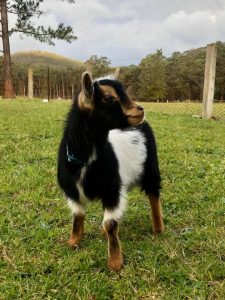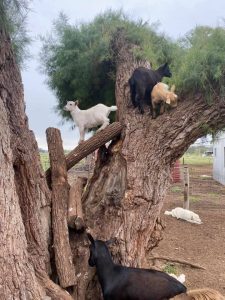Pet Nigerians
Photo credit – Mary Tyler-Jordan, American Jewell Farm
The joy of owning a goat often surprises first-time goat owners. They make you laugh, provide hours of entertainment and often lift your spirits when you need it the most. But like any pet, there is a lot you need to know and learn about keeping them happy and healthy.
Understanding the commitment
Goats live for on average 10 – 15 years which is a considerable commitment. There is a myth that goats are good lawnmowers and are pretty much set and forget. Just put them in a paddock and they will look after themselves. Nothing is further from the truth. Goats need interaction from their people, they need things to stimulate them and they need quality food and hay, regular hoof trimming and yearly vaccinations, as a bare minimum. Nigerians, even with their small size, need a reasonable amount of land. A standard surburban backyard is not suitable for keeping goats.
Costs of keeping Nigerians
Fencing, sheds, feed, water, shade, supplements and medical treatment are all costs that you need to factor in when making a decision to buy pet goats. As mentioned above goats don’t just live on and eat pasture.
It’s import that they get a varied diet including pasture, good quality hay which should be available at all times, browse (leaves and bark) and once a day a grain mix or commercially prepare Goat Mix. They also need mineral supplements to keep them healthy. While it’s much cheaper to keep a Nigerian Dwarf Goat because of its space and feed requirements being much less than a regular size goat these are all things you need to consider when deciding if you are ready to keep a Nigerian Dwar Goat.
Finding your new Nigerian
We would highly recommend you buy from a registered breeder. You can find a list of our breeder members by clicking the link below:
 When you speak with a breeder there are some important things you need to ask. Are you a registered breeder and is your heard tested for CAE/JD and is it clear?
When you speak with a breeder there are some important things you need to ask. Are you a registered breeder and is your heard tested for CAE/JD and is it clear?
Johne’s disease is a serious wasting disease of goats, which can lead to loss of production and death. The disease is caused by a bacterium (Mycobacterium paratuberculosis) that lives mainly in animal intestines, but can also survive in the outside environment for several months. Johne’s disease affects animals by causing thickening of the intestinal wall resulting in a reduction in the normal absorption of food.
Caprine Arthritis Encephalitis (CAE) is a progressive, debilitating, and contagious disease in goats. It has a long symptom free incubation period followed by a gradual onset of disease, so goats can be spreading disease within the herd but not showing any outward signs that they are infected.
Other questions to consider asking are, what is the temperament of the goat, any health issues now or in the past, what food do they eat, what husbandry is required and when is their next vaccination due.
Reputable breeders will be able to provide all this information and they will be willing to share their knowledge and ask questions of you to make sure you are well prepared to provide a suitable home for thier animals.
Pick up day
 On pick up day you need to make sure you have a suitable way to bring them home. A full size Nigerian will fit into a XL dog crate which will fit in most cars. If that is not an possible then an enclosed trailer or livestock trailer would be suitable.
On pick up day you need to make sure you have a suitable way to bring them home. A full size Nigerian will fit into a XL dog crate which will fit in most cars. If that is not an possible then an enclosed trailer or livestock trailer would be suitable.
Before you take your new family member home you should make sure it looks healthy, go over again with the breeder how to feed, trim the goats hooves and give the yearly vaccination. You also need to make sure the goat has an ear tag. And lastly, make sure you have the breeder’s contact details so you can call them if you have any questions or concerns. It would also be good to get a copy of their current CAE/JD test result.
Many breeders will provide you with enough feed for a few days. You should have already discussed with the breeder what they have been eating and where possible have this food on hand. If you are planning on changing what they eat this should be done very slowly so as not to upset their Rumen and make them sick.
Before you leave the breeder should provide you with a Vendor Declaration and a Health Statement which are legally required to transport your new goats.
Settling in
When you get them home they are going to be unsettled for a few days. Goats are herd animals and they have just been taken from their herd and in the case of young goats possibly also their mothers. It’s best to pick them up in the morning to give them time to adjust to their new paddock and shed before nightfall. Spend as much time with them as you can in the first weeks and come with treats and food each time so they get to recognise you as a source of food and goodness. Keep an eye out for signs of stress as the ride home and having to establish themsef in a new herd or surroundings can cause stress and sometimes illness in goats. Make sure they are drinking and eating and if you have a concern ring their Breeder for advice.
One last thing to do
Enjoy these delightful, fun-filled and loving creatures that will steal your heart and enrich your life.
